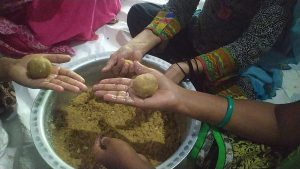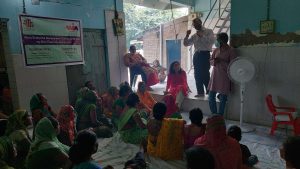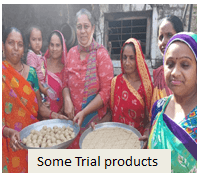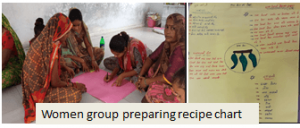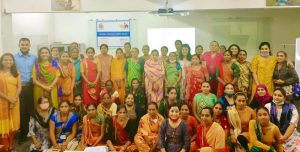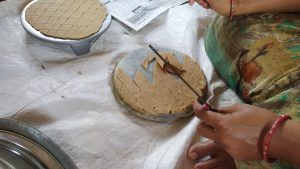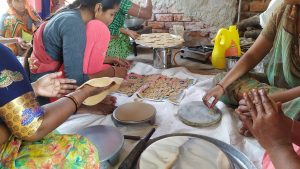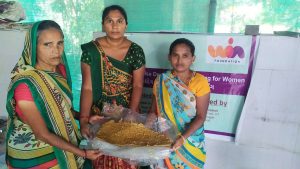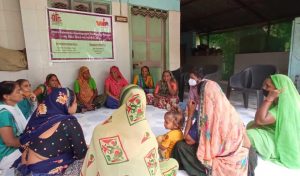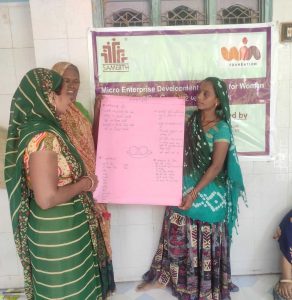Objectives of the project
- To promote women empowerment through women led micro enterprises
- To promote nutritive intake in the vulnerable communities, focusing on children and young women.
Proposed area
Directly working with 5 Self Help Groups from Palwada gram Panchayat and Awareness building on importance of nutrition in school, Aganwadis of five-gram panchayats of Sanand (Sari, Matoda, Palwada, Kasindra & Moraiya). Thus, the dedicated trainings will be conducted in one gram panchayat, but awareness building and other activities will be conducted in all 5 panchayats.
Population of the area
Approximately there are 5000 households in the project area (combining all 5 gram panchayats). Thus, the total population is anywhere between 20,000 to 25,000 people.
Strategy & Interventions:
The project is divided into following major components. These are separate, but interlinked components. Samerth will work to ensure that activities are coordinated for synergies and best outcomes.
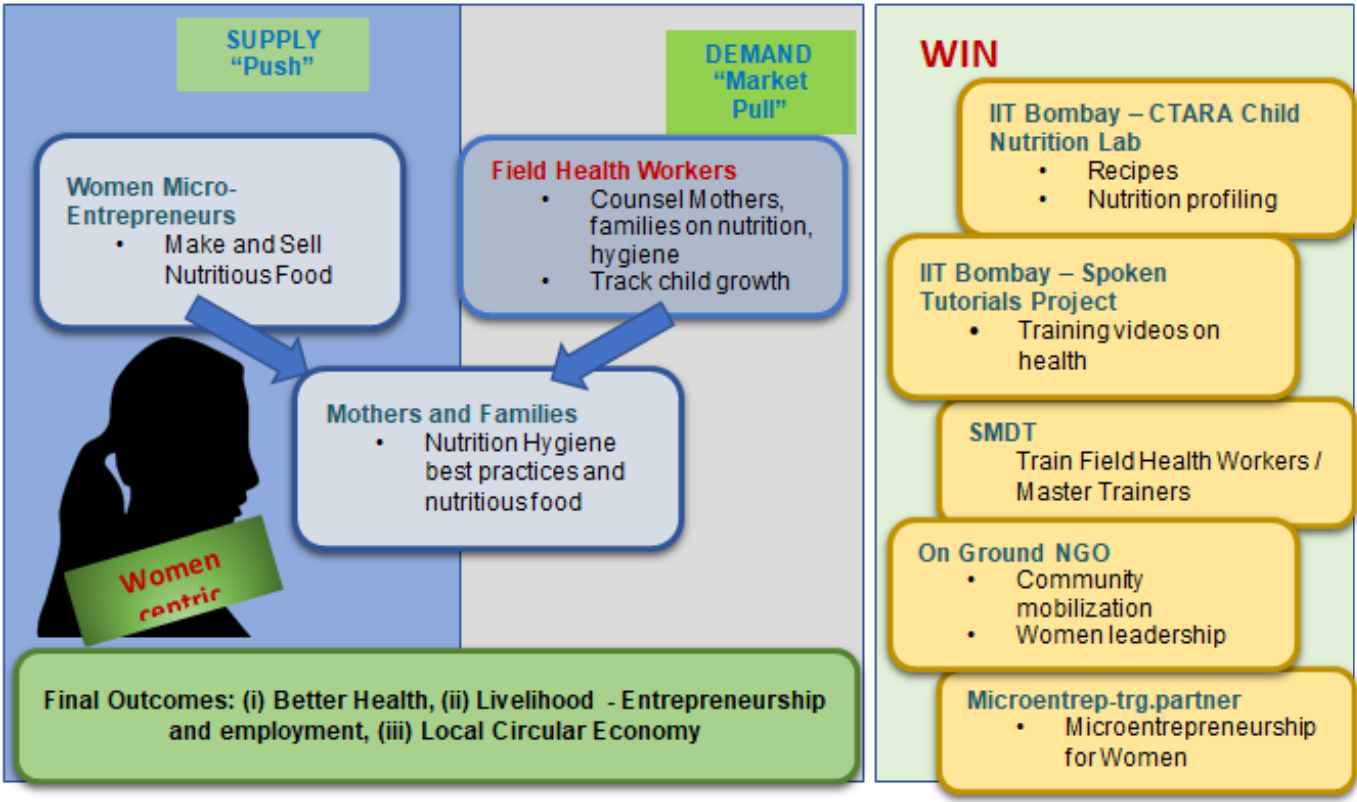
WIN foundation is supporting the following activities to address the issue of inadequate dietary intake
Following interventions will be carried out to achieve the project objectives:
- Microentrepreneurship for Nutrition
- Lead by Master trainer: Mr.Nikesh Ingle, supported by Samerth and Nutrition analysis guidance from ChiNu,CTARA, IIT Bombay
- Identification of potential micro-entrepreneurs from the community willing to undertake entrepreneurship
- Assess the capacity of the identified micro-entrepreneurs to survey and identify markets and products, handle other business functions to help devise training and mentoring needs.
- facilitate the formation of micro-entrepreneurship groups (each group expected to be 3-5 members), to form separate micro-ventures.
- Handholding of microentrepreneurs to support them with necessary advice/inputs for all aspects of business-like supply chain and production, packaging, quality control, regulatory approvals. sales, marketing, branding, HR, Finance, facilitating tie-ups and collaborations in product testing, packaging etc.
- Tracking the microentrepreneurs progress on all these parameters to help and guide them to grow. This will be done at regular intervals, over a period of 1.5 years.
- Training of Trainers on Nutrition:
- to be led by SMDT, supported by Samerth Charitable trust for ground-level coordination, and follow up
- Dr Rupal Dalal and her team will deliver 3 days of Training of Trainers (ToT) to these selected women as per her program and also provide the kit for the Trainers (print and electronic)
- Training of above group on nutrition for 1st 1000 days starting from conception, including mother’s nutrition, newborn nutrition by mother’s feeding and subsequently additional food – up to approx. 2.5 years of age.
- The Master Trainers / Public Health Workers / Health Champions will carry on their role as trainers and counsellors for the community, particularly for mothers, and in general for the community to bring greater awareness and adoption of practices for better nutrition. They will also track health parameters among the target population, particularly expecting and lactating mothers, infant children and adolescent girls, at pre-defined regular intervals over the project period, to track the impact of the project.
- Other steps for building awareness for nutrition among the community:
Mass awareness event (Mela/Mega Event):
These events will be organised in project areas with the concept of “Learn with Fun”, using creative Information Education Communication (IEC) tools to engage target group (adolescent girls, pregnant women, lactating mother etc.). Activities like health camps, stalls of nutritious food products, facilitating access to government schemes, games and competitions, will be carried out. Mela will have a range of activities to address the diverse interests and needs of the community that may include health camps, stalls of nutritious food products, facilitating access to government schemes, games and competitions.
Food & Recipe Demonstration:
Main aim of this activity is to share recipes of simple home-made nutritious food items with the target audience. This will encourage healthy and nutritious food habits to directly help address the issues around mal-nourishment. Launch of food products by the microentrepreneurs during this activity, to provide them a platform to showcase their product and get feedback and also for other community members to understand potential for micro entrepreneurship
Capacity-building of women groups:
The women groups will consist of women leaders from SHGs promoted by Samerth. Training will mainly focus on three major topics; Nutrition & Anaemia, Maternal Health, Sanitation & Hygiene. Training will also enable them to access nutrition and health entitlements, by increasing their knowledge and awareness.
Celebrating Mamta Divas – Educational and awareness campaigns would be undertaken among women and girls to promote regular ante-natal check-ups, immediate breast-feeding, family planning, referral care, Haemoglobin check-up and finally safe deliveries in facilities of their choice.
Project Outcomes:
- High awareness and positive attitude towards health and hygiene among the community
- Pool of Master Health trainers and counsellors from among the community to work within the community for better health and nutrition in long term.
- Decrease cases of undernutrition among vulnerable groups of targeted communities.
- At least a few successful microentrepreneurs to provide livelihood and improve quality of life within the community and build role models within community.
About Project Partners :
Samerth Charitable Trust :
Samerth is a non-profit organization, founded in 1992, that works towards development of a humane, sustainable and equitable society. The focus is on improving the conditions of marginalized communities and to that extent Samerth helps vulnerable communities to gain access to their social and economic rights and their programs are developed as per the requirement of the respective communities.
A safe and sustainable water supply, basic sanitation, and good hygiene are fundamental for a healthy, productive, and dignified life. And yet, many of India’s poor rural people lack access to an improved water supply and improved sanitation facilities. Samerth Charitable Trust has been working on these issues in the Kutch District of Gujarat and Kabirdham District of Chhattisgarh, which are characterized as the most arid and drought-prone regions of India.
For more details, visit Samerth website.
Shrimati Malati Dahanukar Trust:
Shrimati Malati Dahanukar Trust (SMDT) was established in 1960 to address the community educational needs in Shrirampur, Maharashtra. While continuing to address education, SMDT widened its scope to include women and child welfare and environment & sustainability since 2012.
SMDT has been helping children get their rights to a healthy childhood and access to quality education. By empowering the women and self-help groups it is achieving financial parity among villagers to avail healthcare, education and nutrition. Through its various sustainable initiatives, SMDT is ensuring that we inhabit a healthier environment where animals are treated with as much care and concern as we enjoy.
For more details, visit the SMDT website
Mr.Nikesh Ingle – Certified Master Trainer
Nikesh Ingle, has done his masters in Technology and Development (IIT Bombay) and have been working on developing rural entrepreneurs from last 6 years. He has trained more than 1000 SHG entrepreneurs, to start and run own business at local level. Nikesh has been working with stakeholders related to rural development for over 9 years. From voluntary engagement with social organisations to being policy professional with MoRD. Nikesh has worked with relevant government authorities to design & develop ecosystems for effective policy implementation. He works with communities to identify strengths, needs and understanding development from the end user perspective.
Check out Nikesh Ingle’s profile on LinkedIn


